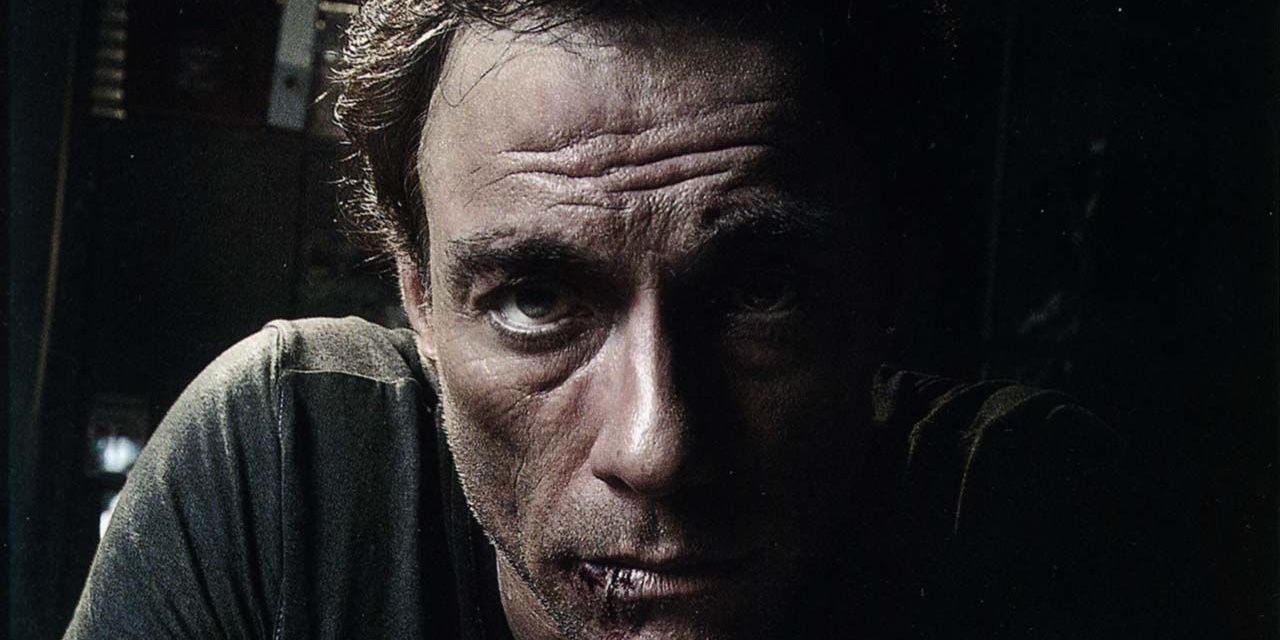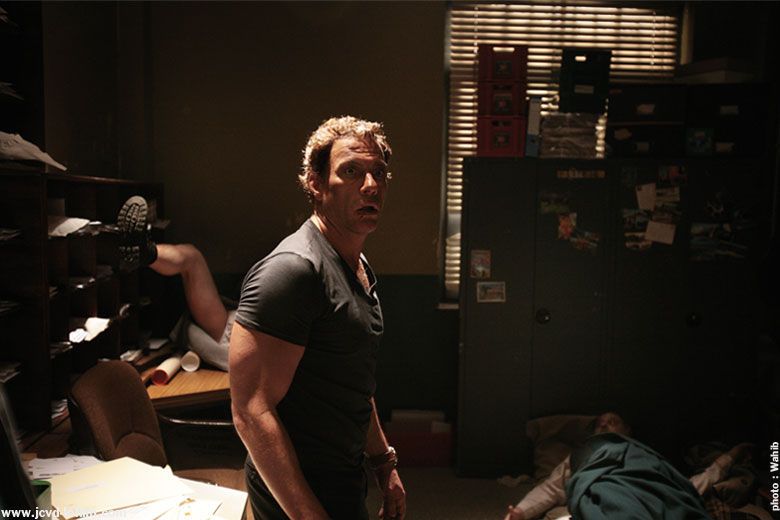Screen Rant's Kofi Outlaw reviews JCVD
JCVD, the Jean-Claude Van Damme meta-movie from French filmmaker Mabrouk El Mechri, was one of two films to make it into the prestigious final round of Screen Rant's list of this year's hot International Picks. (You can read a review of Screen Rant's other international pick, Let The Right One In, here.)
Having now seen JCVD, I can congratulate myself for picking two very enjoyable movies. And JCVD is indeed a very enjoyable film--provided that you know what you're getting into. I advise that you approach this film with the understanding that it is going to be more Being John Malkovich than it is Bloodsport, with a dash of Pulp Fiction thrown in for good measure.
JCVD is a meta-movie in the sense that it acknowledges itself as being a work of cinema, breaking the so-called "4th wall" to let us, the audience, know that the movie knows that we are watching. Most times this direct address is done in a humorous winking fashion (such as the fantastic title sequence, a five-minute continuous tracking shot of Van Damme, sneaking through a war-torn terrain while dispatching bad guys with martial-arts finesse, rescuing hostages and saving the day, until the whole five-minute sequence is ruined when the 4th wall literally collapses, revealing all the set pieces, stuntmen, actors, and f/x tricks that go into making Van Damme look like an action hero-while the real Van Damme is doubled over, out of breath, supremely frustrated, unable to deny that age and hard living have robbed him of the physicality he once possessed.) At other times in the film, the direct address to the audience is impassioned, pained--and even genuinely moving in one unforgettable instance (more on that later).
In terms of plot, JCVD goes the Pulp Fiction route. The film is told in "chapters", each of which gets a zen-like title such as "The Answer Before The Question". And like Pulp Fiction, the story is told in anachronistical order, and from multiple (often intersecting) points of view. It might seem a bit confusing, but the general plot summary is pretty basic:
Jean-Claude Van Damme is an aging action star going through a bitter divorce and custody battle. He needs money to pay his lawyers, and new roles are not exactly rolling in by the pile. With few doors left open in Hollywood, Van Damme opts to return to Brussels, his roots, in order to clear his head and maybe find a renewed career in the international market. Upon arriving in Brussels Van Damme travels to the local post-office to pick up the funds he needs to pay his lawyer, only to stumble into a robbery attempt that quickly turns into a hostage situation. Through a combination of bad luck and public (mis)perception, Van Damme gets fingered for the crime-in-progress; his face gets splashed all over the news, and even while cops surround the post-office, a larger crowd of fans begins to gather outside the post office in support of their hometown legend.
Like I said before, the structure of the film is very Pulp Fiction-ish. At first we are placed in the point of view of some local Brussels residents, star-gazing at Van Damme the movie star as he tries to go about his daily life. This POV is interesting in that it forces us to consider the image of celebrity and how that image seldom holds up to the reality of the person behind it. It's also a hilarious device: two video store clerks are arguing over 80's action flicks when they spot Van Damme headed to the post office; they beg him for pictures and autographs, then snicker behind his back about how much shorter he is in person, how he's aged, how his star power has almost dimmed completely, etc. In effect: we get a portrait of ourselves, the celebrity-obsessed public, tinged with hints of the cruel judgments we make about those rewarded with fame.
Later on in the film we get the very same introductory sequence, this time from Van Damme's point of view. We see what it feels like to be the real person behind the celebrity image - how exacerbating life is when that image begins to overshadow the person, and how absurd the demands of celebrity can be when juxtaposed to the context of "real" life. Through later flashbacks, we learn the full context of Van Damme's life on this particular day: Why he needs to go to post office so badly, where he's coming from, where he's trying to get to, and everything that is at stake in his life. Finally, when the threads of our understanding are fully woven, the plot plays out like a slightly skewed version of the Hollywood action movie formula--an adequate (not great) ending which I won't ruin for you here.
Van Damme discovers real life is no action flick in JCVD
However, before the end arrives, Jean-Claude Van Damme manages to deliver the scene of his career (his acting career, I mean, not his action career). Held hostage, facing an uncertain fate, Jean-Claude's body literally floats up from his chair--above the scene, above the soundstage, above the lights and cameras in the rafters, until it is just him, hovering above, talking directly to the audience about the misspent life and fruitless accomplishments of Jean-Claude Van Damme.
To call it a gutsy performance would be an understatement: Van Damme repeats every negative thought the public has ever had about him--every joke ever made about his talents or stalling career--and let's us know that not only has he heard those disparaging words many times over, but that he has the same view about himself, every day: Jean-Claude Van Damme, the fading action star. There is no bitching and moaning in his delivery, no appeal to our compassion. Van Damme's self-assessment is blunt, harsh, and as profound as it is masochistic. He pulls no punches (no pun intended), tearing himself down until he is a sobbing mess, and then, beyond that breakdown to the calm, composed, clinical diagnosis that this is his existence, however great or pathetic it may be. It is the epitome of a truthful performance, and showcases a range of emotion no one would have EVER guessed Van Damme would be able to convey. One the best monologues I've seen on film.
I give JCVD 3 1/2 stars only because I wish the focus had remain fixed on Van Damme at all times. While the film is slick, stylistic and very unconventional with its narrative structure, it's also a tad bit frenetic, jumping back and forth between the viewpoints of half a dozen different characters who, while interesting for the most part, are not altogether important to the film. This is Van Damme's story, so in my opinion we should have been in his head 100% of the time. But that's a gripe that I'm sure others will debate.
Bottom line: if you are that middle-of-the-road movie lover who loves art-house fare AND old-school 80's testosterone flicks, definitely check out JCVD. I guarantee you'll come away familiar with a Jean-Claude Van Damme you never even knew existed.


